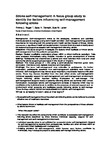Self-Management and Self-Management Support Outcomes: A Systematic Review and Mixed Research Synthesis of Stakeholder Views
| dc.contributor.author | Boger, E | |
| dc.contributor.author | Ellis, J | |
| dc.contributor.author | Latter, S | |
| dc.contributor.author | Foster, C | |
| dc.contributor.author | Kennedy, A | |
| dc.contributor.author | Jones, F | |
| dc.contributor.author | Fenerty, V | |
| dc.contributor.author | Kellar, I | |
| dc.contributor.author | Demain, Sara | |
| dc.date.accessioned | 2019-06-06T16:05:58Z | |
| dc.date.available | 2019-06-06T16:05:58Z | |
| dc.date.issued | 2015 | |
| dc.identifier.issn | 1932-6203 | |
| dc.identifier.issn | 1932-6203 | |
| dc.identifier.uri | http://hdl.handle.net/10026.1/14260 | |
| dc.description.abstract |
INTRODUCTION: Self-management has received growing attention as an effective approach for long-term condition management. Little is known about which outcomes of supported self-management are valued by patients, their families, health professionals and those who commission self-management services. This study systematically reviewed published empirical evidence in accordance with PRISMA guidelines to determine the outcomes of self-management valued by these key stakeholder groups, using three prominent exemplar conditions: colorectal cancer, diabetes and stroke. AIM: To systematically review the literature to identify which generic outcomes of self-management have been targeted and are considered important using three exemplar conditions (colorectal cancer, diabetes and stroke), which collectively have a range of features that are likely to be representative of generic self-management issues. METHODS: Systematic searching of nine electronic databases was conducted in addition to hand searches of review articles. Abstracts were identified against inclusion criteria and appraised independently by two reviewers, using a critical appraisal tool. Synthesis of findings was conducted using mixed research synthesis. RESULTS: Over 20,536 abstracts were screened. 41 studies which met the review criteria were fully retrieved and appraised. The majority of evidence related to diabetes. Few studies directly focussed on stakeholders' views concerning desired self-management outcomes; the majority of evidence was derived from studies focusing upon the experience of self-management. The views of health care commissioners were absent from the literature. We identified that self-management outcomes embrace a range of indicators, from knowledge, skills, and bio-psychosocial markers of health through to positive social networks. CONCLUSIONS: Patients', families', health professionals' and commissioners' views regarding which outcomes of self-management are important have not been clearly elicited. The extent to which bio-psychosocial indicators relate to successful self-management from the perspectives of all groups of stakeholders is unknown. Further investigation regarding which self-management outcomes are considered important by all stakeholders is necessary to guide the commissioning and design of future self-management services. | |
| dc.format.extent | e0130990-e0130990 | |
| dc.format.medium | Electronic-eCollection | |
| dc.language | en | |
| dc.language.iso | eng | |
| dc.publisher | Public Library of Science (PLoS) | |
| dc.subject | Colorectal Neoplasms | |
| dc.subject | Diabetes Mellitus | |
| dc.subject | Family | |
| dc.subject | Female | |
| dc.subject | Health Personnel | |
| dc.subject | Humans | |
| dc.subject | Male | |
| dc.subject | Outcome Assessment, Health Care | |
| dc.subject | Self Care | |
| dc.subject | Stroke | |
| dc.title | Self-Management and Self-Management Support Outcomes: A Systematic Review and Mixed Research Synthesis of Stakeholder Views | |
| dc.type | journal-article | |
| dc.type | Journal Article | |
| dc.type | Research Support, Non-U.S. Gov't | |
| dc.type | Review | |
| dc.type | Systematic Review | |
| plymouth.author-url | https://www.ncbi.nlm.nih.gov/pubmed/26162086 | |
| plymouth.issue | 7 | |
| plymouth.volume | 10 | |
| plymouth.publication-status | Published online | |
| plymouth.journal | PLOS ONE | |
| dc.identifier.doi | 10.1371/journal.pone.0130990 | |
| plymouth.organisational-group | /Plymouth | |
| plymouth.organisational-group | /Plymouth/Faculty of Health | |
| plymouth.organisational-group | /Plymouth/Users by role | |
| dc.publisher.place | United States | |
| dcterms.dateAccepted | 2015-05-27 | |
| dc.identifier.eissn | 1932-6203 | |
| dc.rights.embargoperiod | Not known | |
| rioxxterms.versionofrecord | 10.1371/journal.pone.0130990 | |
| rioxxterms.licenseref.uri | http://www.rioxx.net/licenses/all-rights-reserved | |
| rioxxterms.licenseref.startdate | 2015 | |
| rioxxterms.type | Journal Article/Review |


